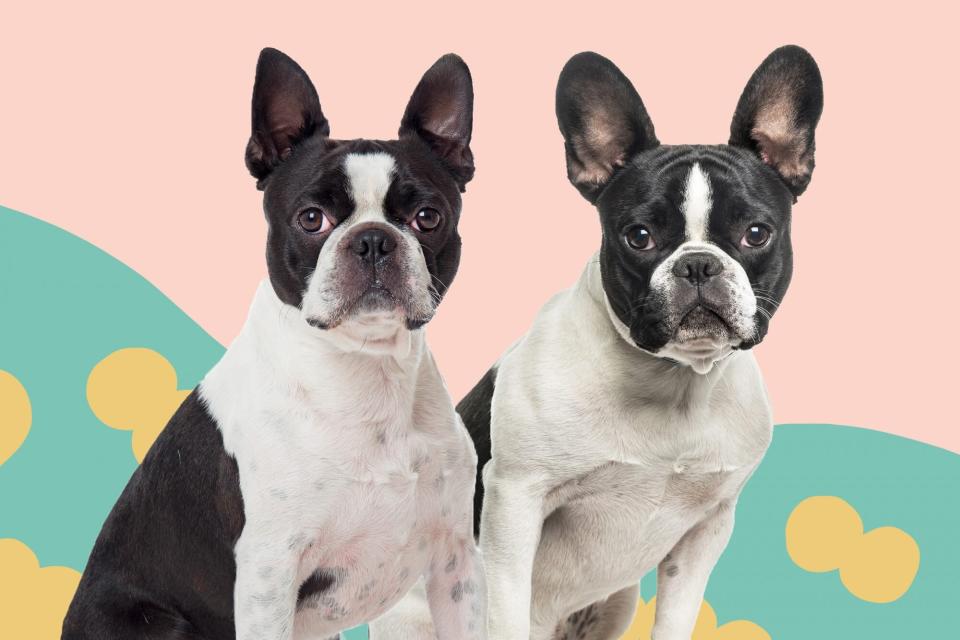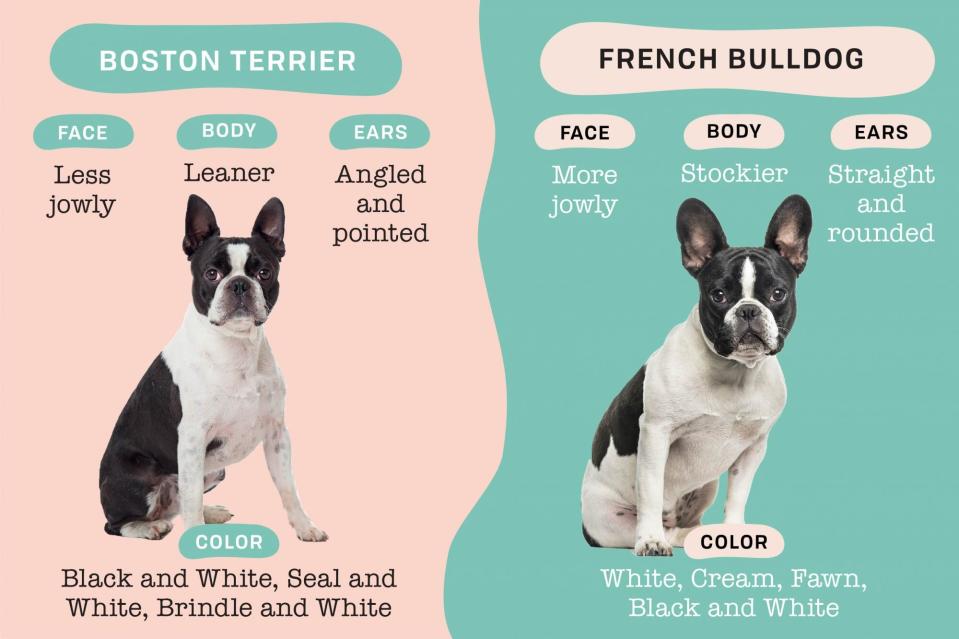Boston Terrier vs. French Bulldog: If You Must Choose Only One, Here's What to Know
At first glance, if you spot a Boston terrier and a French bulldog trotting on a sidewalk together, determining which is which might stymie you a bit. The 'American Gentleman' and the 'Frenchie' are both popular dogs, mascots, and celebrity favorites. And if they're sporting a dual image of black and white tuxedo splendor, it's a real challenge to know who's who!
So to help us outline the similarities and differences between a Boston terrier and a French bulldog, we asked Jackie Moyano CPDT-KA, PMCT, founding member of Behavior United, to provide some pointers.
How to Tell the Difference Between a Boston Terrier and a French Bulldog
Sometimes, it's all about personality! While every small dog is unique, certain breeds are simply known for particular characteristics, and this is also true for these two English natives (yep—the French bulldog actually originated in England!)
"If Boston terriers are the clowns at the circus, then French bulldogs are the acrobats." Moyano says. "Boston terriers give you that giggle factor as they prance around smiling at you. French bulldogs give you that wow factor as they defy gravity leaping through the air."
Moyano adds some aspects of temperament are heritable, so it's ideal to know the health and temperament of a dog's parents and grandparents.

Yeji Kim / Dora Zett / Shutterstock / Eric Isselée / Adobe Stock
Other Temperament Differences
It's not as though your terrier will greet you every morning with a whistle and clipboard, because he likes to be as couch cozy as the next pup, but keep this in mind: if you desire a Boston terrier, you've got to have your wits about you! He thrives on mental stimulation (as most terriers do) and will be much happier if you offer plenty of puzzle toys, tricks, and activities. Reinforcers help establish bonds and make training more rewarding.
A Frenchie might need a bit more of your patience during positive reinforcement training, as she's slightly mischievous. Scampy, even. She might sit on cue, or she could break out into 'zoomies' when she sees a butterfly. She'll often do whatever you like if there's a belly rub involved, but she's still a 'free thinker' with the attitude to match.
Here are some other Boston terrier and French bulldog differences you might notice.

Yeji Kim / Dora Zett / Shutterstock / Eric Isselée / Adobe Stock
Boston Terrier vs. French Bulldog Size, Appearance, and Age
While you don't need a magnifying glass, you still might have to pause and peer closely at these two pups, as mere inches and a few pounds separate them. (And you might be looking at a popular hybrid of the two, the Frenchton! You never know.)
So here's a handy guide to help you tell the difference between the Boston and the Frenchie:
Without a doubt, a Boston terrier's perky ears look as though they can transmit satellite signals (awwww!) but you'll notice many people love to refer to a Frenchie's 'bat ears'—which really are bigger and rounder than the terrier's.
The Boston terrier is leaner and taller, standing up to 17 inches, whereas the Frenchie is stockier and shorter at about 13 inches.
The bulldog is also more hefty than the terrier. "Boston terriers are easier to pick up than French bulldogs," Moyano says. "The Frenchie owner should start doing squats and have a strong back before bringing their Frenchie home!"
The lifespan of a Boston terrier is 11–13 years, and for a French bulldog, it's 10–12 years.
Probably the greatest difference between Boston terriers and French bulldogs is their coat colors. While both breeds are often black and white, a terrier will likely be bi-colored with an even distribution of white and maybe chocolate, liver, and seal (a reddish hue). Plus he'll almost always have a white stripe between his eyes. A bulldog might also be bi-colored in these same shades, but will often switch it up a bit with a solid coat, a black mask, or a big patch of an alternate color across her chest.
However, both puppers will gaze at you adoringly with wide mocha-colored eyes, which of course makes them quite irresistible and worthy of every subscription box o' goodies!
Boston Terrier vs. French Bulldog Health
In this category, you'll notice many similarities between these good dogs. For example, both are susceptible to various eye conditions. And as much as we love their sweet little smooshed-up faces, Boston terriers and French bulldogs are brachycephalic breeds, which means they're frequently prone to respiratory diseases and breathing problems.
Moyano says because they're flat-faced, both dogs also have a risk of obstructed airways, and sometimes surgery is necessary for better respiratory health. She adds brachycephalic dogs have difficulty breathing on airplanes, so it's best to arrange for a pet sitter when you travel—or plan on dog-centered road trips where they can ride along with you.
Heat and exercise isn't really a good combination for Boston terriers or French bulldogs, either. It's just too tough for them to breathe. "And they're prone to overheating, so great caution should be taken on hot days," Moyano says. "If you live in a hot climate, be willing to leave your brachycephalic dog at home in the air conditioning rather than take them to the farmers' market."
Give your pupper a good stretch of the legs with daily walks in the early morning or late evening when temps are milder. Find other ways to make them comfortable when it's hot too, such as a chill bed or a cooled dog house. Unfortunately, Frenchies have a heavy front structure and can't swim, but might enjoy splashing under a sprinkler!
Boston Terrier or French Bulldog: Which Dog Is Right for You?
Both dogs are terrific pet pals for humans eager to explore all their best characteristics. Moyano offered a few more facts to help you determine which dog is most compatible for your lifestyle.
You might prefer a Boston terrier if you're:
Able to embrace his independence and intelligence by offering a safe environment with plenty of enrichment opportunities.
Eager to have an active canine playmate who's great with kids.
Dedicated to making sure he has his people to play, exercise, and hang with most of the day, every day, so he's not left alone too long. Truthfully, being with his people is what this dog loves most of all.
A French bulldog might be your choice if:
You can provide a patient balance of early socialization and training—along with the ability to laugh when she veers off-track.
You're in need of the perfect cuddly apartment dog for yourself or an older loved one.
Cleaning a little (OK, maybe a lot!) of drool off the furniture isn't a big deal.

